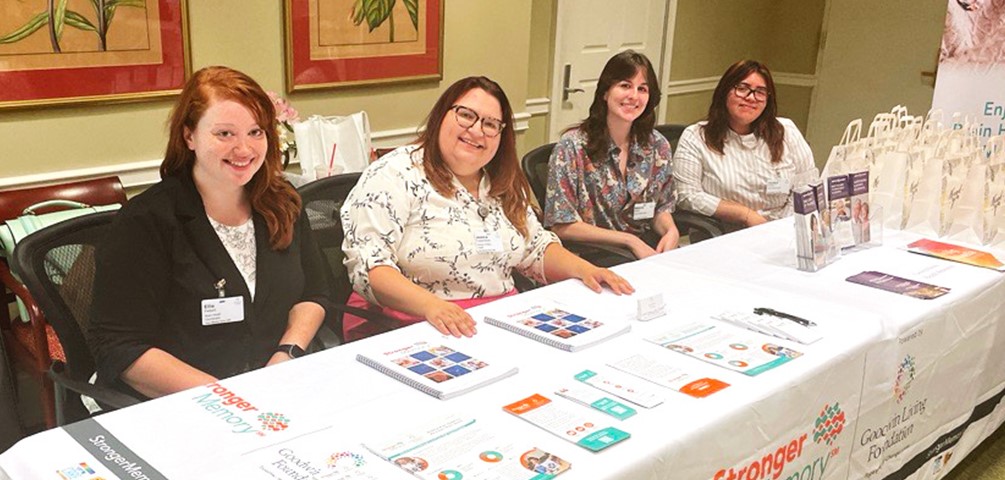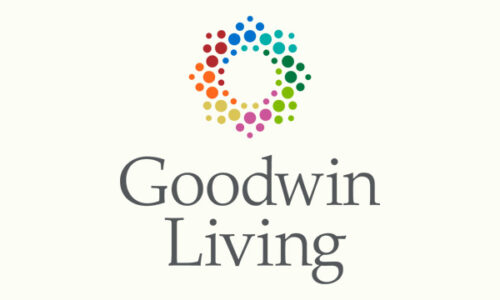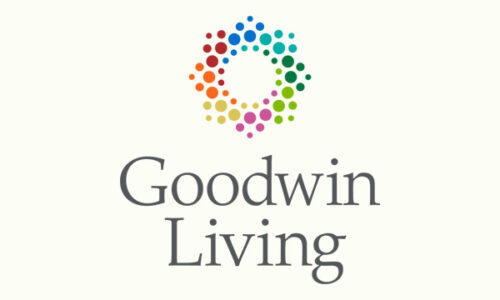June 30, 2023
What We Wish People Knew About Dementia
By Jessica Fredericksen
As Director of Brain Health at Goodwin Living, I spend most of my day working with people who are living with challenges such as Alzheimer’s disease and other forms of dementia. I also work with people who simply want to maintain their brain health as they age. The Goodwin Living Brain Health Department creates programming to support brain health among the residents of the three Goodwin Living senior living campuses and members of Goodwin Living At Home. We also provide training and guidance to the 1,200+ Goodwin Living team members who serve residents at our campuses, members and patients of our hospice, home health and rehab services. Additionally, as managers of the StrongerMemory program, our work also impacts thousands across the country.
Working in brain health, we couldn’t let Alzheimer’s and Brain Awareness Month pass by without doing our part to raise awareness about Alzheimer’s and other forms of dementia. As you might imagine, we’re asked countless questions about brain health every day by those who are navigating a diagnosis of dementia for themselves or a loved one, and by those who are concerned about preserving their brain health as they age. Here’s what we wish more people knew about Alzheimer’s and other forms of dementia.
People Living with Dementia Can Still Do Things
While a diagnosis of dementia can be difficult to process and living with dementia can create new challenges and barriers, we can still find plenty of opportunities to live a high quality of life and reasons to smile and laugh. People living with dementia can still make choices, can still have a sense of humor and laugh with you and, most importantly, can still experience the full range of emotions.
Those living with dementia are still capable of doing a lot of things. We may need to adjust our expectations or adjust the way that we approach a conversation or a problem, but doing so allows us to interact in a way that will highlight our skills. For example, the Montessori approach for dementia care highlights the ability for individuals with dementia to be able to relearn how to do activities such as eating with a fork. Using modification and repetitive routines and actions, individuals living with dementia can still learn. In fact, many enjoy learning new things and having new experiences.
Put the Person First
The key to any interaction with someone living with dementia is to remember that they are a person and treat them as such. They are more than their disease. Patience and some willingness to go with the flow can allow us to have great relationships with individuals living with dementia and to support them in maintaining a high quality of life with as much independence and choice as possible.
Learning a little bit about dementia through programs like Dementia Friendly America or through the Alzheimer’s Association can give you some great tools for connection and conversation. Become a Dementia Friend and put the person first.
Reduce Your Risk of Dementia
While there is no certain method of preventing Alzheimer’s or dementia, we can take steps to reduce our risk and promote our brain health.
One of the most persistent myths of brain health is that at a certain age, our brains stop creating new cells. This is absolutely untrue. Research on neurogenesis tells us that it is in fact possible at any age to create new neurons in our brain. In fact, the topic of brain health is not an issue specifically relating to the aging process. Brain health is—and should be—an important topic to consider at every stage of life, from birth to teenage years, to adulthood and beyond.
Research has shown that everything we do to and for our bodies from an early age can significantly impact our health as we age. It is also important to note that it is never too early or too late to start implementing little changes into your daily routine.
We like to promote the Six Pillars of Brain Health for simple ways you can tweak your daily routine to promote good brain health.
- Be Social – Engage in conversation with others, join a local group or club, or make time to talk with friends or family on the phone.
- Engage Your Brain – There are many ways we can engage our brains and promote positive brain health and prevent Alzheimer’s disease. We can try to learn new things by picking up a new hobby, attending a class or exploring a subject that is unfamiliar through an audiobook, presentation or documentary. This increases our neuroplasticity, which is the brain’s ability to continue to learn and adapt. We can also engage our prefrontal cortex and our working memory, which helps with short-term memory retrieval and focus. Doing simple brain exercises like reading aloud, writing by hand and doing simple math quickly like with the exercises in the StrongerMemory program can help improve recall and focus.
- Manage Stress – We all encounter stress, so we can’t avoid this entirely. That makes it essential that we take steps to manage our stress as quickly as possible when we do get stressed. When we are under stress, our brains release a chemical called cortisol. Too much cortisol in our brains over time can increase our risk of dementia. Taking time to relax and learn coping skills for your stress is a great way to reduce your risk of dementia. If you are struggling with what coping skills might work best for you, talking with a counselor, social worker or creative arts therapist is a great place to start.
- Ongoing Exercise – Daily simple exercise is great for our brain health and reduces our risk of dementia. Simple cardio is best, something like brisk walking or simple light weights to get your heart rate slightly elevated. When we exercise, our blood becomes highly oxygenated and flows through our entire body. Exercise feeds our brain because it gets a lot of highly oxygenated blood up to our brain.
- Restorative Sleep – Getting a good night’s sleep is important to reduce our risk of dementia. When we sleep for a solid 6.5-8 hours a night our brain has time to process all the information it took in that day, decide what needs to be stored in long-term memory and what can be tossed aside, and the brain physically flushes itself out with fluid. To ensure we’re getting restorative sleep, we can engage in good sleep hygiene like going to bed and getting up at the same time every day, not being on screens right before bed, and avoiding alcohol 2-3 hours before bedtime.
- Eat Right – Food and nutrition can go a long way towards reducing our risk of dementia. Eating lots of green, leafy vegetables and lean protein helps give our brains the nutrients it needs. Additionally, eating berries and healthy fats like avocados or olive oil can help ensure our brains are functioning at their best. Antioxidants can help reduce any inflammation in the brain. Too much processed sugar or alcohol can actually cause some inflammation and should be avoided.
And for our last tip…
Never Underestimate the Power of Hydration!
The amazing power that just one glass of water can have on your brain function. Research has shown that being just 1% dehydrated can lead to a 5% decrease in brain function. If you’re feeling a bit foggy or having trouble focusing or recalling words, drink a glass of water and see if that helps. Personally, I often experience a bigger pick-me-up from a glass of water in the afternoon than I do if I have a second cup of coffee!
Every day, our team encourages people to take steps to reduce their risk of developing Alzheimer’s or other forms of dementia. We also work to help people better understand how to interact with people living with dementia. In these efforts, we do our part to raise awareness of Alzheimer’s and other forms of dementia. We hope that by sharing this, we will inspire you to learn more and to share what you’ve learned with others!
________
Goodwin Living Director of Brain Health Jessica Fredericksen, CDP, MSW, RCAL, joined Goodwin Living in early 2021 as Brain Health Program Manager. She is focused on advancing brain health and dementia awareness through education, the StrongerMemory program and serving on the Dementia Advance Team. Jessica is a Certified Dementia Practitioner (CDP) with a Masters in Gerontological Social Work (MSW) from Washington University in St. Louis. Before joining Goodwin Living, she worked for an Assisted Living & Memory Care company in the Midwest where she gained experience as an Executive Director and Corporate Director of Community Excellence. When she’s not focused on brain health, Jessica enjoys volunteering with her church’s Youth Group and taking hikes with her cockapoo, Chloe Rose.





